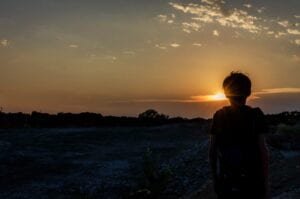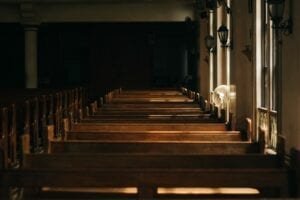A Retelling of God’s Promise to David
God has given David rest from his enemies and he finds himself at ease. He’s sitting in his palace made of cedar. A palace that’s better built than every other dwelling around. But David can’t put his mind to rest. He keeps thinking about the Ark of the Covenant that’s sitting outside his palace.
You see, the ark’s not just sitting outside of the palace. It’s sitting in a tent and David is not satisfied that God is outside the palace living in a mere tent while he rests easy inside of his palace, knowing he’s well sheltered from storms and such, living in luxury by the day’s standards. It just doesn’t seem right that God would be out in the cold while David enjoys the warmness of his own home.
David wants to build God a temple, and the prophet Nathan agrees that this is a good idea, that God has been with David and will continue to be with David. But in the stillness of that night, a word came to Nathan for David.
God doesn’t need a house to live in. God doesn’t need a box to be put into. God has been with the people every step of the way and he tells Nathan to tell David, did I ever tell you that I needed a house, or a palace, or a temple to live in? No. God wasn’t interested in David building him a house because instead, God was going to build David an everlasting house. A house, a kingdom, where God would appoint a King who would reign forever.
David was trying to put God in a box but God can’t be put in a box. David was trying to build a kingdom for God but humankind can’t build an everlasting kingdom or a kingdom that could contain God. No, it would be out of God’s unfathomable love that God would build a house, would build a kingdom that exists for the sake of the world.
God was okay being out in the cold where the people were because God was going to breathe new life into the world. It would be Jesus out of the line of David, Jesus the Lion of the tribe of Judah, that God would make the King of all Kings, the Lord of all Lords, the King who was more interested in people than places, because ultimately, God is love.
More Resources
- Narrative Lectionary commentary on 2 Samuel 7:1-17 – Sara Koenig
- Narrative Lectionary commentary on 2 Samuel 7:1-17 – Roger Nam
Storyline Commentary on 2 Samuel 7:1-17
Every story can be broken down into a few parts. The setting, where the story takes place and why it might be important. The characters and their emotions and thoughts invested in the story. A tension that needs resolved. A resolution that brings us through the tension, and a through line (aka main idea) that carries the story through from beginning to end.
The Setting David has settled in his palace and God has given him rest from all of his enemies around him.
The Characters
- David who is living at peace in his palace constructed of cedar
- God who is living in a tent outside of the palace
- Nathan the prophet, who relays God’s words to David
- God who tells David that David will not build a house for God, but who instead tells David that he will build a house for David.
The Tension David is living in a strong palace and God is outside in a lowly tent and this troubles David. The tension escalates when God tells David, “Are you the one to build me a house to dwell in?” God doesn’t need a house but David has fallen into the trap of thinking he needs to take care of God, and that somehow it’s a house built with human hands that indicates care. But God cannot be put into a box. God has something different in mind.
The Resolution David will not make God a house. God will make David a house, a dynasty where the lion of the tribe of Judah will reign. God has been with them wherever they go and God will provide the place of rest for his people. God will establish a kingdom that will last forever from David’s son, and that son isn’t Solomon. That son is Jesus.
The Through Line We don’t establish God’s kingdom. God establishes his kingdom. Our call is not to build things for God but to partner with God where God is already at work.
Reflections on God’s Promise to David
God giving rest to David and the people in an unusual act in a time when the common belief was for the people to give a place of rest to their gods. Instead of King David providing a place of rest for God, God provides rest for King David.










